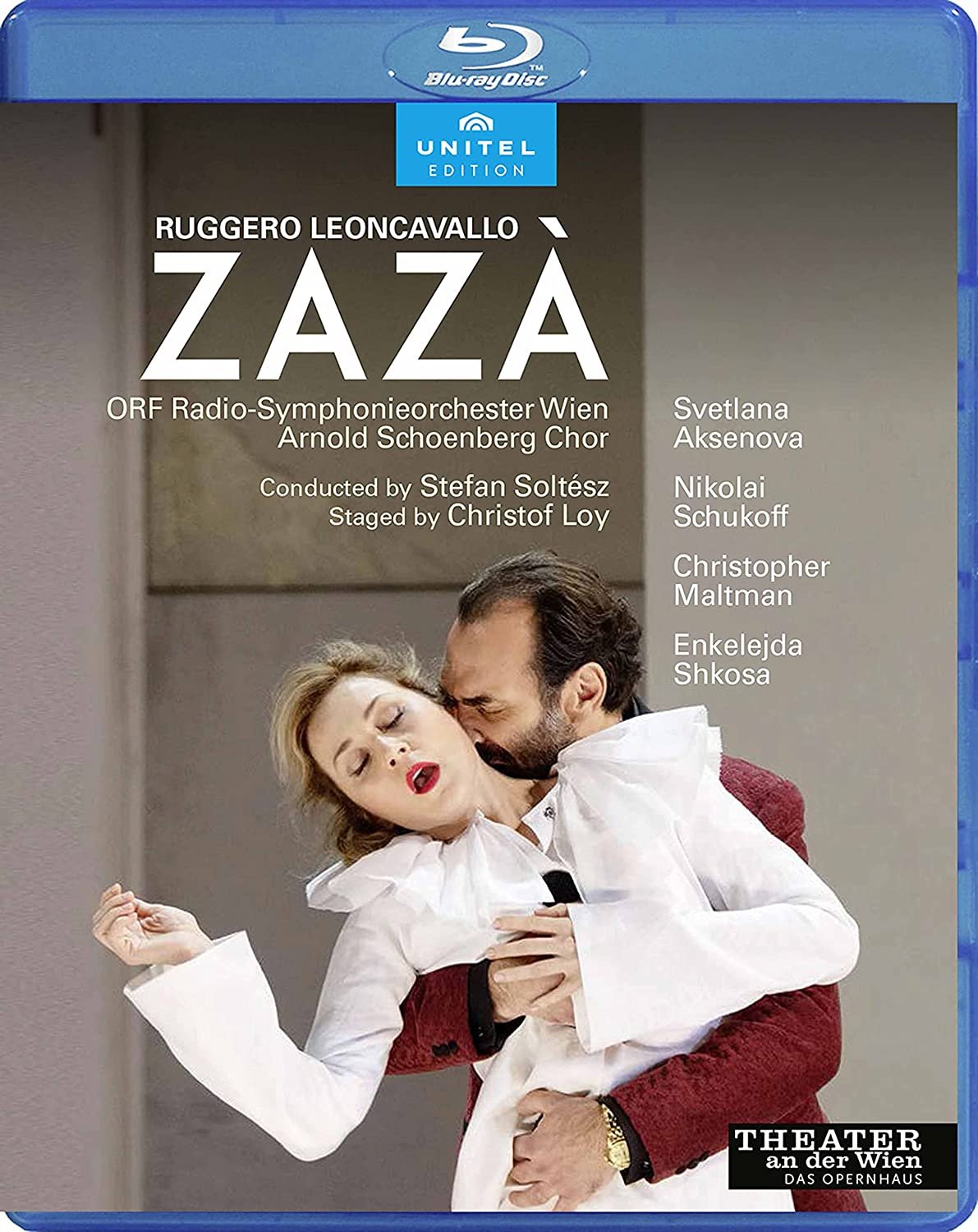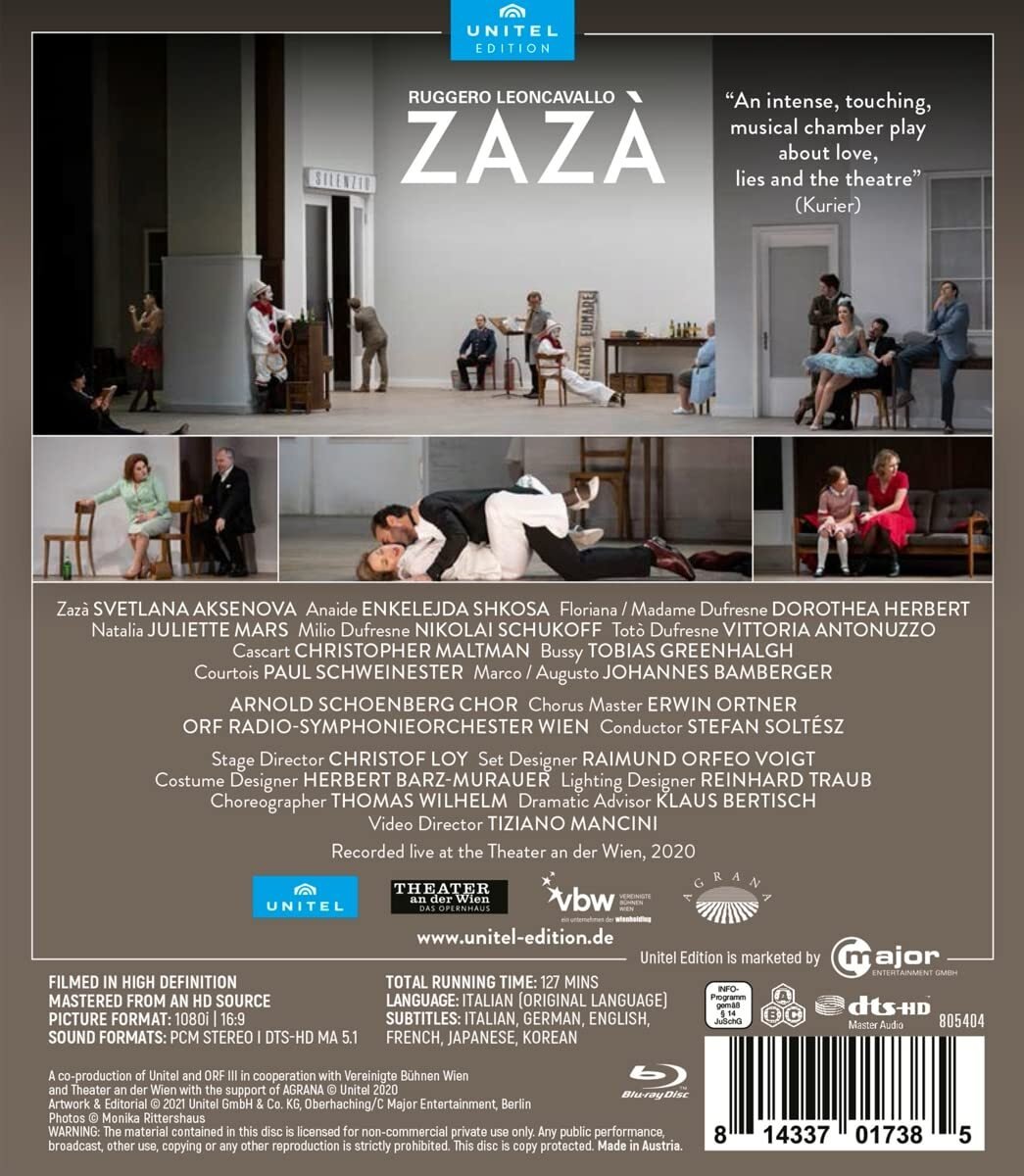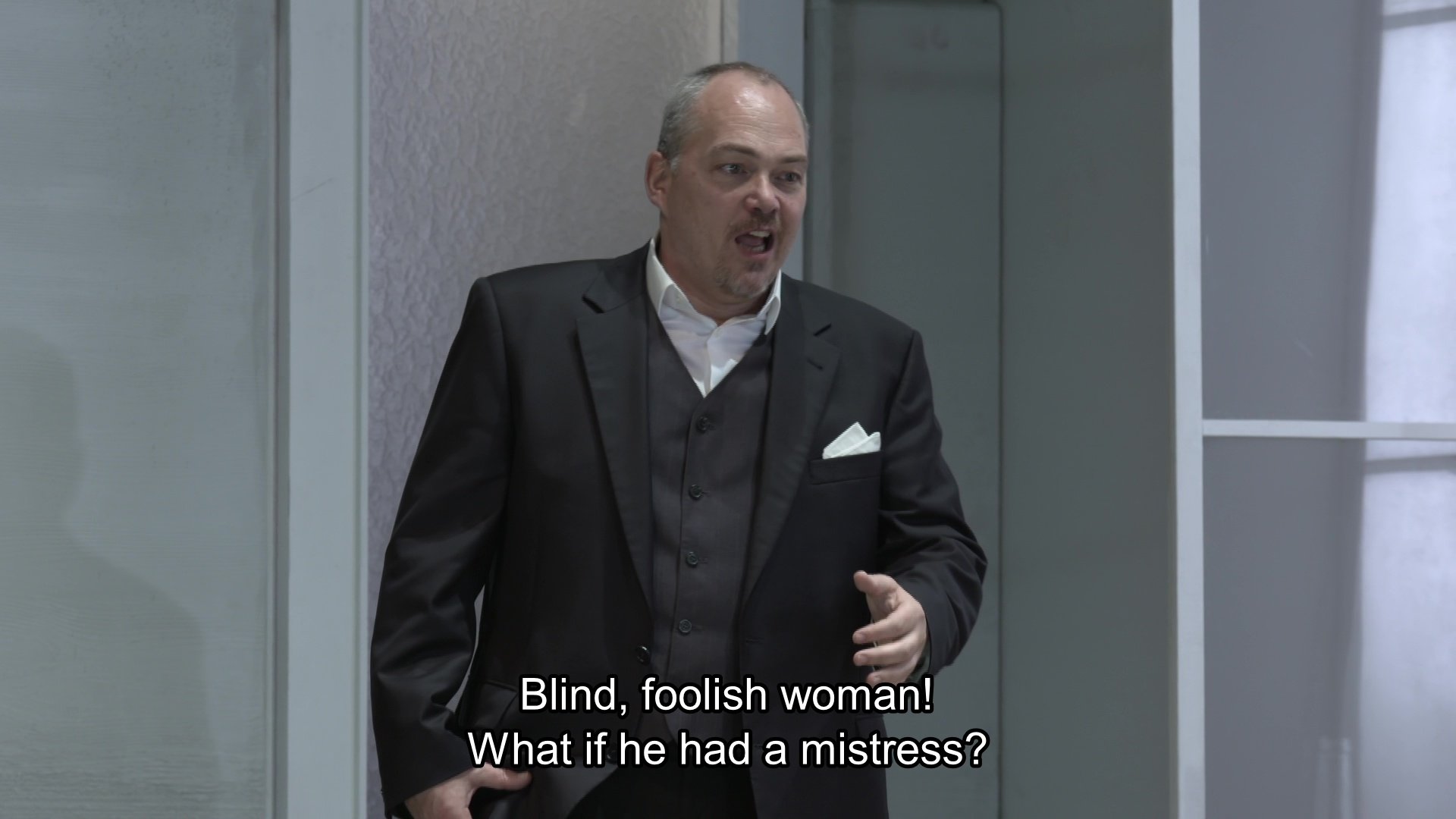

Leoncavallo Zazà opera to libretto by the composer and Carlo Zangarini. Directed 2020 by Christof Loy at the Theater an der Wien. Stars Svetlana Aksenova (Zazà), Enkelejda Shkosa (Anaide), Dorothea Herbert (Floriana / Madame Dufresne), Juliette Mars (Natalia), Nikolai Schukoff (Milio Dufresne), Vittoria Antonuzzo (Totò Dufresne), Christopher Maltman (Cascart), Tobias Greenhalgh (Bussy), Paul Schweinester (Courtois), Ivan Zinoviev (Duclou), Johannes Bamberger (Augusto / Concierge at Dufresne), Patrick Maria Kühn (A Gentleman); Ena Topčibašić (Claretta), Liliya Namisnyk (Simona), Anna Possarnig and Elias Morales (Two Spanish Dancers), Beatriz Delgardo Flores and Elvis Grezda (Two Clowns), Carina Nopp and Diego Federico (Two Artists), Lilo Besold (Dresser), and Fabio Coutinho (Fireman). Stefan Soltész conducts the ORF Radio-Symphonieorchester Wien and the Arnold Schoenberg Chor (Chorus Master Erwin Ortner). Set design by Raimund Orfeo Voigt; costume design by Herbert Barz-Murauer; lighting design by Reinhard Traub; choreography by Thomas Wilhelm; dramatic advisor was Klaus Bertisch. Directed for TV by Tiziano Mancini. Sung in Italian. Released 2021, disc has 5.0 dts-HD Master Audio sound. Grade: A+ with the 💓 designation.
Stefan Soltész conducts in the time of Covid:
Most of the action takes place behind the stage at a regional theater running variety acts:
Zazà (Svetlana Aksenova) is the star. Here she defends her mother, Anaide, who is unpopular with Zazà’s colleagues:
And here’s Anaide (Enkelejda Shkosa), an insufferable pest. Abandoned by her husband, she raised Zazà under desperate conditions. Now she drinks up a fraction of Zazàs wages at the theater bar and constantly wheedles money out of her daughter to boot:
Zazà started singing for tips on the street, but now she is close to stardom. She falls in love with Milio (Nikolai Schukoff), a mysterious businessman from Paris who haunts the dressing room:
Meet Cascart (Christopher Maltman ). He is the male lead in Zazà’s acts. He found her singing on a street corner, trained her, and is now her manager. He was also her lover, but that has cooled. Zazà’s fling with Dufresne is interfering with Cascart’s plan for Zazà’s career. Cascart wants to get rid of Dufresne. He once saw Dufresne in Paris with a woman he assumes was Dufresne’s mistress:
The seed of doubt has germinated, Zazà decides to go to Paris to see if Defresne has a mistress. Her friend Natalia (Juiette Mars) goes along. Through a fortuitous coincident, the ladies are admitted to Defresne’s home by an ancient servant. Defresne isn’t there, but if they wait, he will return presently. The ladies snoop. There’s a wife! This is much worse than a mistress, but Zazà is determined:
Another surprise! An adorable, extremely polite young girl appears with music to practice on the piano nearby. She is:
This leads to a heart-rendering, lightening-fast debate conducted by Zazà with herself in the guise of a casual conversation with Totò. She decides she must forget Dufresne immediatey and flee the scene. Only that sacrifice can protect Totò from the same disaster that blighted Zazà’s life when she was a girl:
Natalia is beside herself with anguish also. The ladies pretend they have come to the wrong address. When Madame Dufresne suddenly appears, the tension ratchets up yet another notch. But Zazà and Natalia manage to stumble out the entry door having done no harm.
Zazà is distraught on her return to the theater. Cascart offers solace.
A final confrontation with Dufresne is also needed to protect Totò. Her reward is to hear her ex-lover call her a trollop:
Zazà thinks:
But we know her life is just beginning:
To protect an innocent girl, Zazà broke the chain of pain. She has repaired the damage to her soul that occurred when she was a girl. Now she will be able to accept Cascart’s advice and perhaps his love as well.
Zazà started its life the same year as Pucinni’s Tosca. Chanda VanderHart gives this a thumbs-up in her bachtrack.com review noting it’s a verismo opera in which no one dies. Moore Parker is even more enthusiastic, writing in operacritic.com, that this rarely done work is “effective music drama elevated by a production in which both the concept and the cast have enjoyed the finest engineering imaginable.” Mark Mandel states in the April Opera News (pages 56-57) that this title “ succeeds in every way” and gives it gets a “Critic’s Choice” award. A sour note come, however, from Neil Fisher in the February 2022 Gramophone (pages 75-76). Fisher says the opera has “a lot of forgettable music in it.” I thought the music is a lot better than that.
Everybody involved in this ensemble piece deserves praises. But I was especially impressed with the personal directing by Loy and the acting of Svetlana Aksenova, Juliette Mars, and Vittoria Antonuzzo. When those 3 are on the stage, I feel like I’m actually in the Dufresne living room—aghast and holding my breath.
Zazà made a bigger impression on me than all of Puccini’s ladies combined. And she didn’t even have to die. Maybe this should be considered a early contemporary opera rather than late verismo. Or maybe it’s really a movie in which psychological and social themes are just as important as the music.
Warning to jaded opera experts: this show does drip a few soap suds. ( This is a joke aimed at readers in the United States who know about sentimental dramas on TV called “soap operas.” These shows are aimed at housewives and sponsored by famous brands of soap.)
Wild surmise: What would happen if Loy staged the same cast speaking their lines with the orchestra playing the score as background music as in a movie? Cutting the signing would, of course, be a sacrilege. But could that work? Well, back to reality. I give this an A+ and my 💓.
Here’s a trailer from C Major:
OR



















